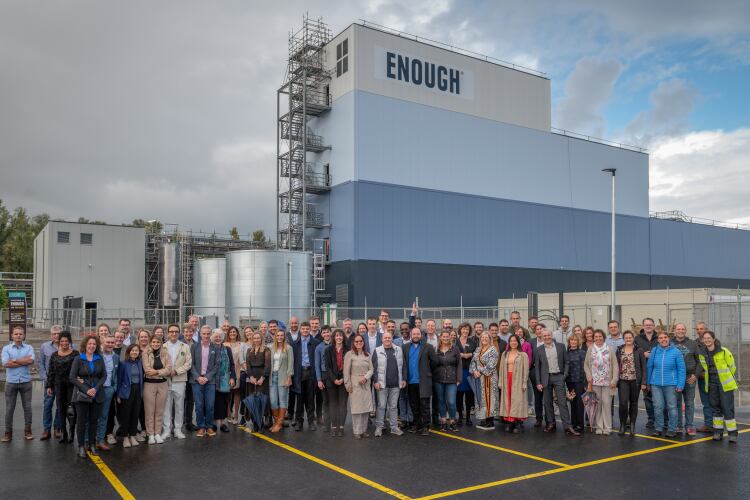One year after breaking ground on the protein facility, food tech company ENOUGH celebrated the completion of the site at a ceremony last week. Initial capacity will stand at 10,000 tonnes per year. The group intends to increase output to 60,000 tonnes by 2027. The company has targeted production of over a million tonnes cumulatively within 10 years of its launch.
The 15,000 square metre facility is co-located alongside the Cargill facility in Sas van Gent in the Netherlands. ENOUGH’s mycoprotein, sold as an ingredient under the ABUNDA brand, is grown by feeding fungi with feedstocks in a large-scale continuous fermentation process. Through a collaboration agreement with the ingredient giant, Cargill will supply ENOUGH with the ‘most efficient’ feed source for its fungi-based protein.
This approach is aligned with the development of the circular economy, ENOUGH noted. The new facility has been supported by the circular Bio Based Europe Joint Undertaking CBE JU with receipt of €16.9 million of EU funding as part of project Plenitude, which involves partners from the full value chain.
Speaking at the ribbon cutting event, CBE JU Executive Director Nicoló Giacomuzzi-Moore, told attendees: “Today’s inauguration of Plenitude’s plant demonstrates Europe’s leading role in supporting bio-based innovations in the world. The Abunda mycoprotein produced in PLENITUDE’s first-of-its-kind biorefinery uses a zero-waste process to offer consumers a sustainable and affordable meat alternative, while taking pressure off ecosystems and natural resources. The CBE JU support to this project has helped to reduce capital costs and boost technological efficiency of the plant. I would like to congratulate ENOUGH and the project partners with this important milestone and thank them for their contribution to the local economy and EU’s climate targets. We look forward to continuing supporting the consortium in this key endeavour.”
Fermenting a more sustainable future for protein
ENOUGH believes that fermentation will play a growing role in the transition towards a more sustainable food system that is capable of feeding the growing global population within planetary boundaries.
Livestock farming represents 15% of all GHG emissions, the company claimed. With protein consumption forecast to double in the next 30 years, a protein transition is ‘crucial to meet the protein gap sustainably’.
ENOUGH’s focus is on adding capacity to support the pace and scale of the required protein transition. According to the start-up, ENOUGH’s process is readily scalable to use any locally grown feedstock and the company’s medium-term goal is to grow over a million tonnes cumulatively by 2032. To do so will require over 300k tonnes of annual capacity and ENOUGH anticipate that this will be spread over a a minimum of three locations to ensure production is close to both feedstocks and consumers.
“ENOUGH’s aim is to grow capacity for sustainable non-animal protein sources in line with needs of the market. There are multiple forecasts about the pace of potential market growth and at this time the constraint on growth is a supply chain challenge of providing high quality protein sources at scale that can make delicious foods,” CEO Jim Laird revealed.
The impact from switching 1M tonnes from animal sources to ANUNDA is the equivalent of replacing 5 million cows, or over 1.2 billion chickens, and reducing more than 6 million tonnes of CO2 emissions or the equivalent of planting >30 million trees, data provided by ENOUGH suggests.
The company is also focused on ensuring the ingredient it supplies offers high-quality nutrition. ABUNDA is a ‘complete’ food ingredient that contains all nine essential amino acids and is high in dietary fibre. It is described as ‘light in colour, neutral in taste and fibrous in texture’ and is suitable for uses in a variety of applications, including alternative meat, seafood and dairy products.
“As a B2B supplier of a nutritious whole food ingredient, rich in protein and fibre, we support food companies to produce not only delicious and sustainable foods, but healthy and nutritious too. This is fundamental to the continued growth of the sector, permitting the switch to non-animal proteins. The use of minimal processes and short ingredient lists will give confidence to businesses, retailers and consumers alike and is fundamental to the rapid growth of the sector,” Andrew Beasley, Commercial Director of ENOUGH, explained.




